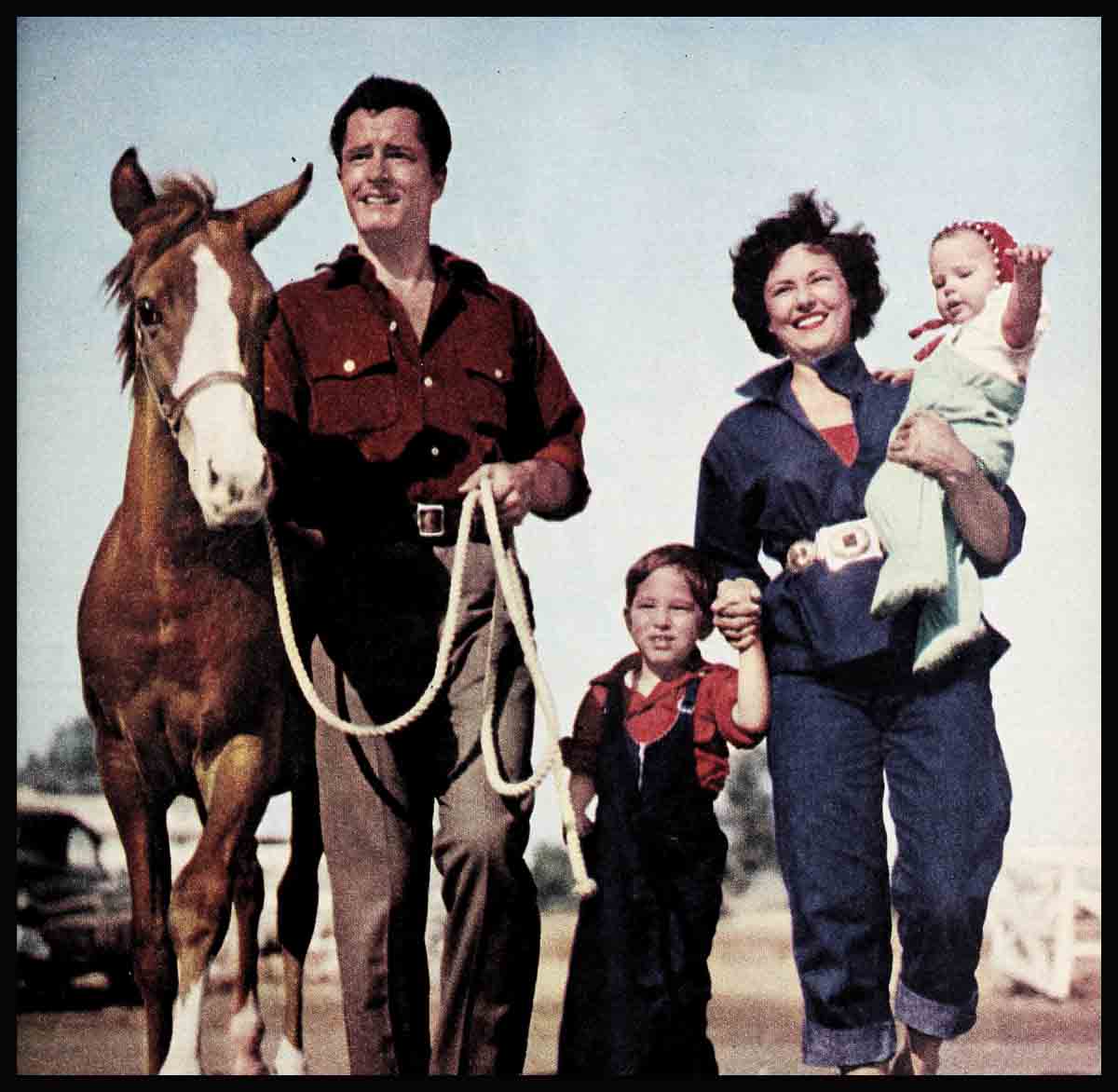
You Need Love In Your Life—John Derek
“Whatever I do, I like to be best,” states John Derek calmly. That statement is the driving force behind the handsome face that caused more fan furor when he didn’t work than most stars receive after a series of hit pictures. Since childhood the challenge of being best has kept John outpacing, out-punching and outrunning the shadow of defeat. Oddly, though, for this outspoken star, he has never said he would be the best actor. Only in physical prowess and material possessions has he had the happy faculty of choosing what he would be best in.
Eleven years ago he became an actor—“because it paid two hundred bucks a week. Every weekend I’d light out with my gang for Lake Arrowhead or Big Bear. I’d blow all my dough and have to as Selznick’s for an advance by Tuesday. I was seventeen and I knew I couldn’t act my way out of a paper bag. I had contempt for actors—but not for the money.”
Eleven years later John sat across a desk from Cecil B. DeMille. Mr. DeMille was holding up a kind and professional mirror for John’s reflection. For the first time, he saw the great possibility of Derek, the actor,—the best. “He was disappointed in my stature,” John remembered. “He wanted me for the part of Joshua, the stonecutter, in “The Ten Commandments.” He had studied me for months and knew more about me than I knew about myself. I was so used to being rushed through interviews that I stumbled over my words for the first fifteen minutes to get out everything I wanted to say. An hour and a half later I was still in here with him. A burning desire to play Joshua and a new enthusiasm for acting actually filled me. Finally, I told him that by the time he was ready to shoot, I would build up my body by scaling it down from one hundred eighty-five pounds to the proportions he wanted by weight lifting and I would be the best Joshua he could find.”
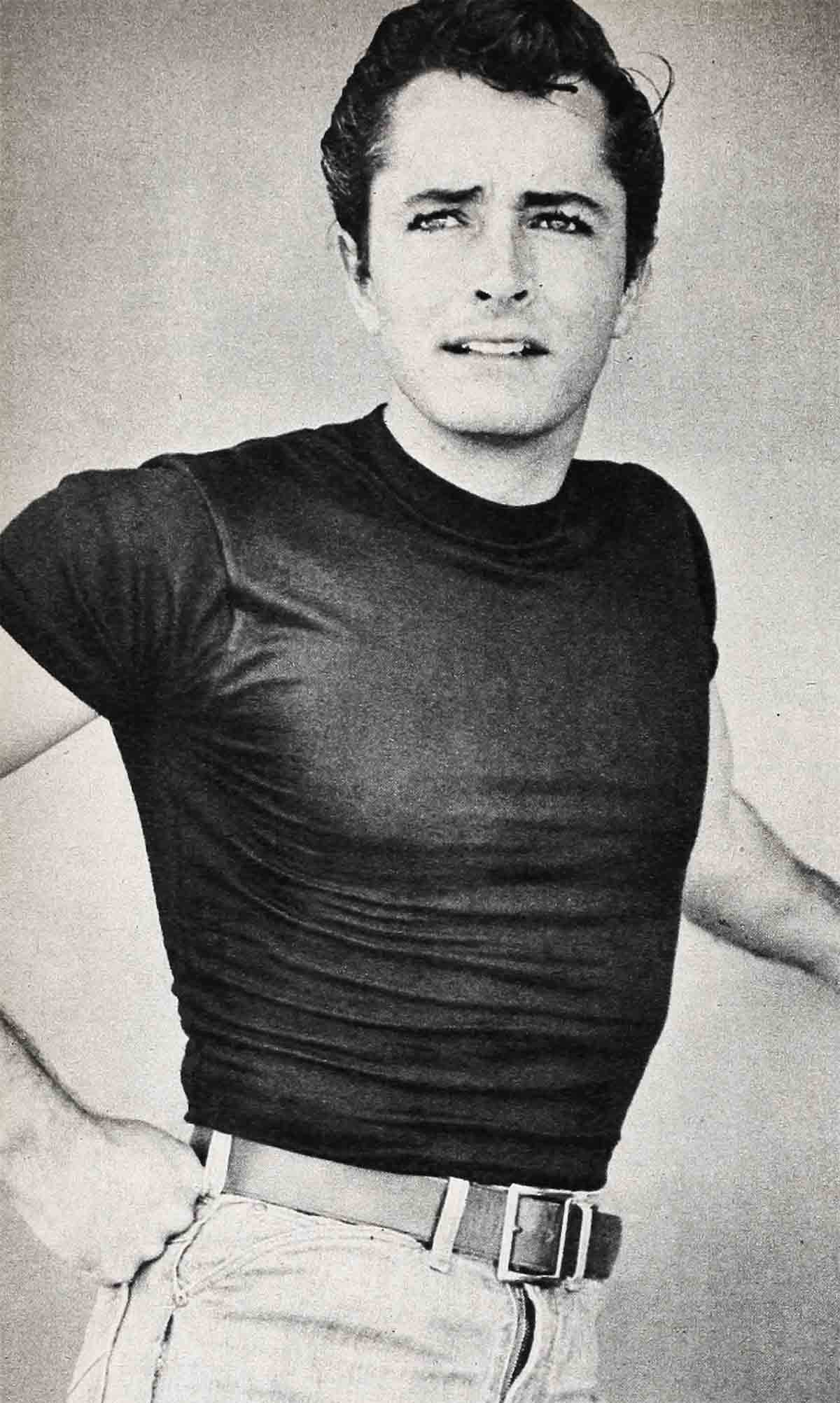
Three months after his conversation a young man of 167 pounds strode into the Paramount commissary in tennis shoes, riding pants and a blue T-shirt. This was the new John Derek. The T-shirt did not hide the powerful muscles of his arms, chest and back. His dark green eyes glowed in his deeply tanned face; he was the picture of John Derek, happy. He had a goal for his driving force to be best and he was succeeding. He had been working out at a gym, was building another at home and was weight lifting, riding and exercising daily. At one time he lost seven pounds in three days. To. guard against collapse, he took many pills each day (vitamin, mineral, and what have you), drank milk constantly and lunched on a combination of whipped eggs, milk, orange juice and honey. “I just found out,” he announced happily, “that Joshua goes hand over hand up a thirty foot rope—no feet, just hands. That’s rough. Then he comes down the same way. That’s going to put callouses on my hands.”
Nothing could have been a happier conclusion than that physical prowess should enter into John’s new enthusiasm and dedication to his career, for physical challenges have always been of utmost importance to him.
“I respect the man; I respect what he is. I don’t respect men that aren’t physical. I don’t care how mental they are. If you can develop a mind, you can develop a body. They’re both equally important. A great mind with no physical power is dissipating half the stuff that’s given you.” John sat quietly, perhaps seeing the pattern that his deep devotion to the physical had formed in his life.
When John makes a statement he means it and often proves it. When the Army beckoned him away from his cush two hundred bucks a week at Selznick’s, he champed at the bit as a line soldier. Then he discovered the Paratroopers, rough, rugged and challenging. “Be a man among men was the lure for me. You’ve got to find out when you’re young, ‘Do I have the guts to do it?’ You always like to test yourself and I thought I was pretty gutty. Paratroopers are the best.”
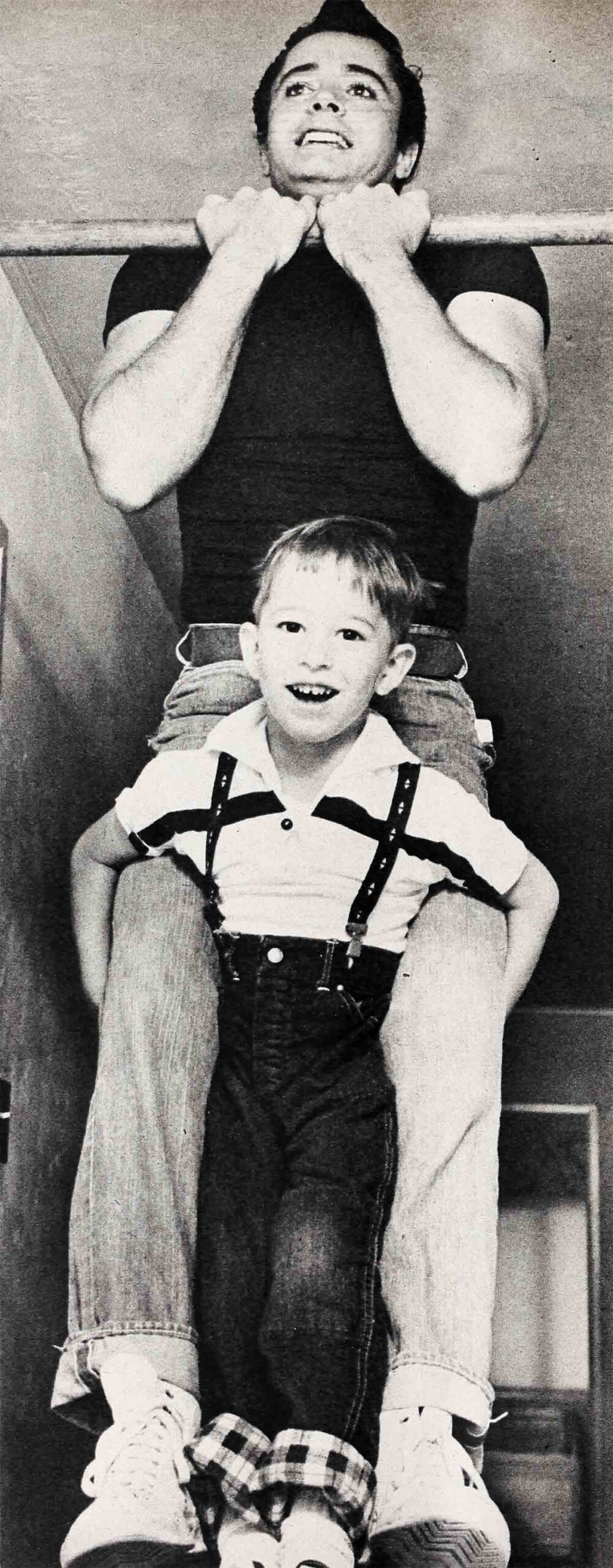
John started testing himself very early in life. His security tottered when he was four. His parents, both beautiful and erratic people, divorced. After that he was shared; sometimes living in a mansion with his too-handsome father, sometimes in a beach cottage with his too-beautiful mother. In their diverse ways they were the epitome of the glamour of Hollywood in the Twenties and Thirties. At times John was exposed to the grandeur of gracious living in an atmosphere of shop talk from his producer-promoter-director father. A chauffeur-driven limousine would pick him up from private or military school and deposit him in the lap of luxury and loneliness. His father would go broke one day, be rich the next. John learned to admire the attitude of ‘let tomorrow take care of tomorrow.’ When he lived with his mother in her beach cottage, he was again indoctrinated with the theory that without money you should still live for today. Buy what you want today, tomorrow will take care of itself.
A handsome product of two handsome people fully endowed with strong personalities, Derec (then Derec Harris), as all children, was forced to begin the fight to establish his own ego, his own personality. As most of his time was spent in military or private schools and his name Derec automatically became the nickname Dare, he began to live up to it. “I dare you” became part and parcel of his claim to fame among his small gang wherever he might be. He was the first to try everything and he was always the best. Was it a struggle to become a person in spite of the two vibrant parents that constantly overshadowed him? Or was it an instinctive desire to take the stigma off his handsome face? At any rate, for a young boy, the nickname Dare was much easier to live with than a nickname of Handsome.

“I’ve lived so long within myself,” he said apologetically years later, “that it’s hard for me to express what I really feel.” The man that saved him from becoming a complete introvert was Russ Harlan, an ace cameraman who lived across the street. He liked the young boy, Dare, and they both loved horses and hunting. It was with Russ that he found the companionship that gave him a deep love and respect for the physical. And Russ challenged him. Through that friendship, Dare acquired a permanent love for horses. It is the only hobby that has remained consistently with him. Even as a child his intense enthusiasms turned to disinterest as soon as he had mastered a new project.
As a youngster, he mastered the art of boxing. Therefore he enjoyed having a group of kids come down to his place and box. He was the best and he began constantly proving to himself that he was the best. He had his nose broken three times. It was never set, but it doesn’t look as if it had ever been broken. Therefore he was juicy picking for some bully that took a gander at his straight nose and decided he had a pigeon for a brawl. He looks back with almost fiendish delight on the surprises he had in store for those jokers.
During junior high and high school (his first entry into public school), he learned that baseball, football and tennis were the most important things to others. So? Naturally, he hit a home run the best could pass a football the farthest and take the best in love sets on the courts. He had no problem in the dating department. He got the most sought after girls easily, took them on dates in his father’s chauffeur-drawn carriage and ignored his good looks (even if his dates didn’t). For the guys liked him. He was accepted completely for his first-class ability to do anything physical and, at that age, prowess is all important.
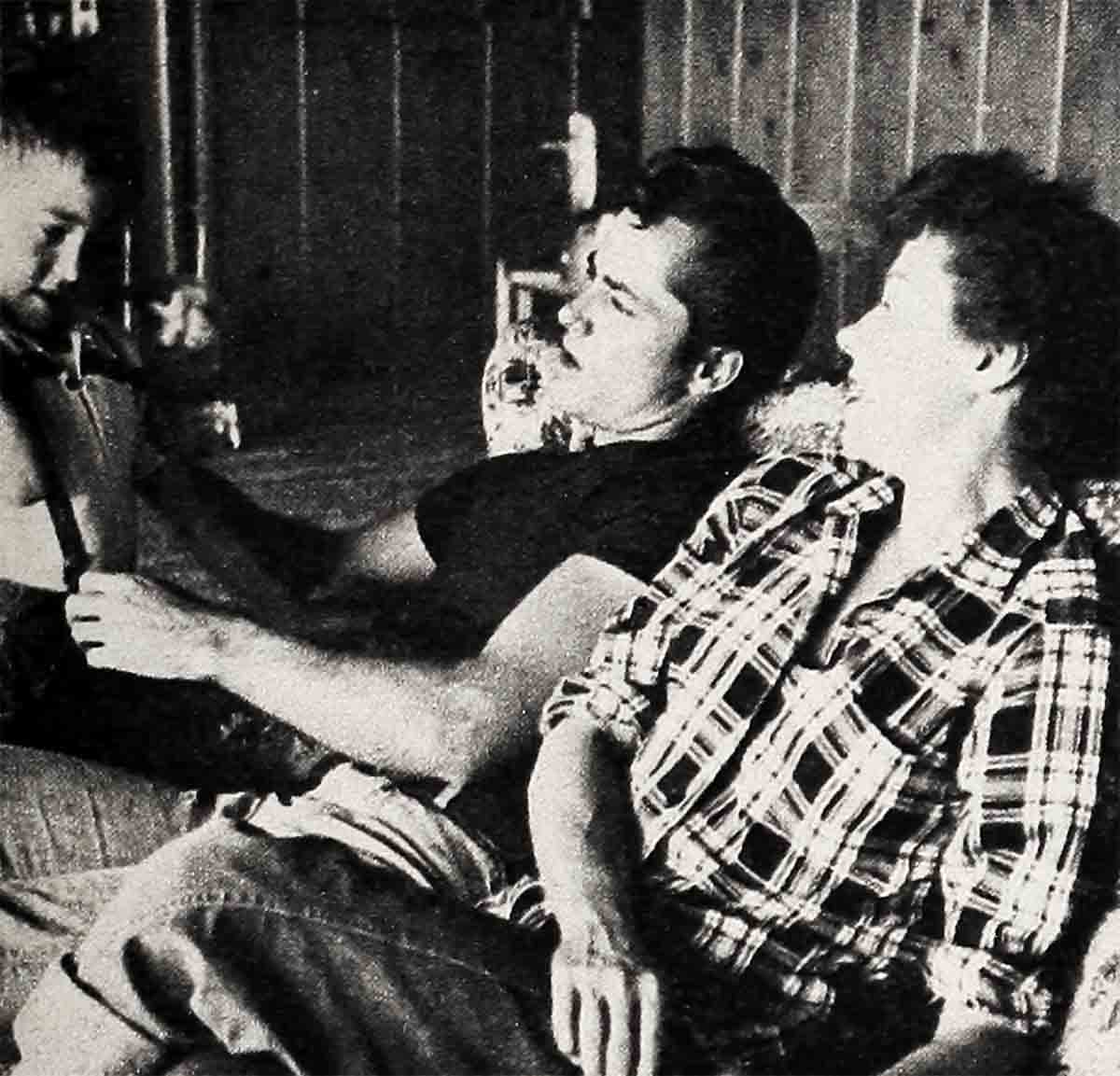
Deeply sensitive and emotional, he had by now learned to hide any expression of his true feeling behind a wall of blunt speech and total lack of interest in others—unless they were interested in his interests. By the time he had proved himself in the Paratroopers and was sitting out a futile contract at 20th, he had established completely the driving force of physical first, material possessions today (even if the finance company takes it back tomorrow) and a rugged honesty in his speech and approach to life that made him stand out from the general run of people.
Pati Behrs was shocked at first by his bluntness. She was under contract at the same studio and deeply engrossed in her ballet when John decided that she was the best. It took a while before she began to understand the man under the outspokenness. She, too, was firm in her convictions and free to express her opinions, but “a girl can get away with it a little better than a man.” She decided that John was the best and when his instant success in “Knock on any Door” caused the biggest mail pull since Valentino, they both felt his career was then solid enough for marriage.

Learning to share himself for the first time came as a jolt to John. He had lived within himself so long that it took constant understanding of his sudden temper tantrums, his need for aloneness, and his constant needs for physical diversions. For his hobbies continued. Now out of the high school age where being able to pick up the heaviest weight was the rule for admiration, he turned back to his beloved horses.
“My first horse cost one hundred and twenty-five dollars. I was proud of it. After Pati and I were married I wanted the best horse, so I got it. First I got an Arabian stud, Fakaar; then I got Tesque Boots, one of the best quarter horses in the country. I’ll never be satisfied. The more money I make, the more good horse flesh I’ll want.”
He also managed to get a beautiful home with five acres overlooking the San Fernando Valley. They scraped up the down payment and John confidently planned on paying it off as his career zoomed. The old attitude of buy what you want put Pati and John way over their heads in debt. But they had the best view in the area.
When Russ, their first child, was born with a separation of the esophagus, John knew for the first time the helplessness of watching a loved one suffer without being able to do anything except hope. He, so proud of the physical, watched his son struggle feebly for life. John and Pati grew strong together in the next year and a half, while they watched Russ constantly for a sign of choking. When he did, they rushed him blue and gasping to the hospital. In between they experienced the feeling that every day might be the last day for their son. Through this outgoing interest, fear and love, John swept away some of his inability to express himself. When he married Pati, he called her Babe, “because Baby sounded mushy.” Now he calls Russ lover with no hesitation or embarrassment.

During this period John was loaded with debt, full of anxiety and working to get out of his contract at the studio. He felt he wasn’t doing his best as an actor. He was considered gloomy Gus by those who knew him well. It was typical that in the midst of impending financial ruin that Derek would dare to gamble on his future.
It was also typical that John would continue to take the challenge of becoming the best at what other men call hobbies. To John they are serious challenges to be conquered. He has managed, however, to be the best in the most offbeat and unusual of physical arts. They are temporary interests however. Once he has mastered them and mastered the master that taught him, he drops the project quickly. Among other proficiencies he has become expert with bull whips, in knife throwing, archery, judo, swimming, boxing, wrestling, shooting and, of course, riding.
One day a friend was discussing a planned tour with John for. “Run for Cover,” the offbeat Western that has John in the role of a warped boy who uses a club foot as an excuse for all his problems. The friend was in cowboy clothes. He had learned to draw his six guns fast. John put on his guns and his friend said, “Pull out your gun. Now I’ll draw, cock and fire and best you.” He did. So John practiced for three weeks. He perfected the draw to one-twenty-fifth of a second. He beat his friend and then beat the man who had taught his friend. “I think,” he said with enthusiasm, “I’ll use this on tour. I’ll shoot a volley of bird shot into the wall and then hit the holes with a knife-throwing act.”
“Run for Cover” brought back the combo of John and Nick Ray, director of “Knock on any Door.” John doesn’t have a deep respect for many people, but to him Nick is the best. So he worked his heart out to give Nick everything he wanted in the picture. “If Nick asked me to crawl across a room crying like a baby and then turn over and kick my heels, Id do it. I trust him.” This is John, the man who worries directors constantly with questions on why the character is doing what he’s doing. This is, indeed, great respect.
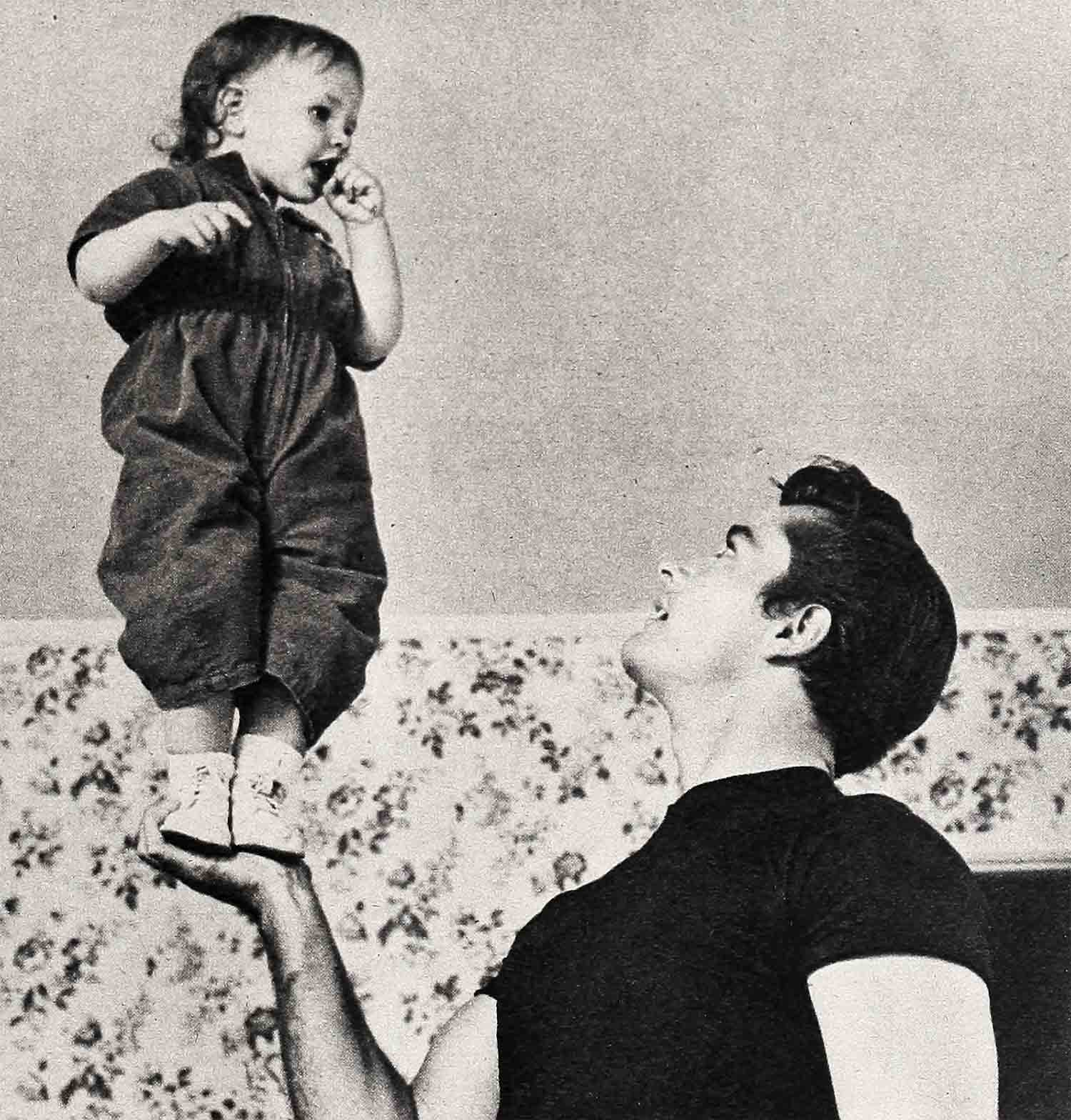
He now has a half-finished project, bullfighting. He met a young matador and became deeply involved in the art. He worked out with calves piddling around with the cape. He went to the bullfights with his friend and stood on the walkway watching and absorbing the technique of the matadors. He learned the passes, movements and the nearest possible way not to be gored. He has not had the time to go to work on the bulls, but he will. For this is a dangerous and exciting sport. “Once again, I want to know how much guts it takes to get there. Oh, I don’t have to prove anything to myself anymore, but this thing scares me. It scares everybody else, too. I don’t feel bad about admitting it, especially when the matadors admit.”
With the knowledge that he doesn’t have to prove his physical superiority, he can look with understanding at his five-year-old son, Russ. After the first rough years, Russ has turned into the kind of a boy that John can teach to ride and enjoy his father’s pleasures. On Easter, he brought up the two horses for a ride with his son. Pati and nearing-two daughter, Sean, looked on with interest. John put Russ behind him on the saddle very reminiscent of the days when Russel Harlan hoisted little Dare up behind him for a ride. Tesque Boots, the pure bred quarter horse, was living up to her name. She shied at an imaginary leaf and Russ was tossed against his father’s back. Russ looked at John, “Tesque Boots,” he explained seriously, “doesn’t feel very well today. I don’t believe I’d better ride her.”
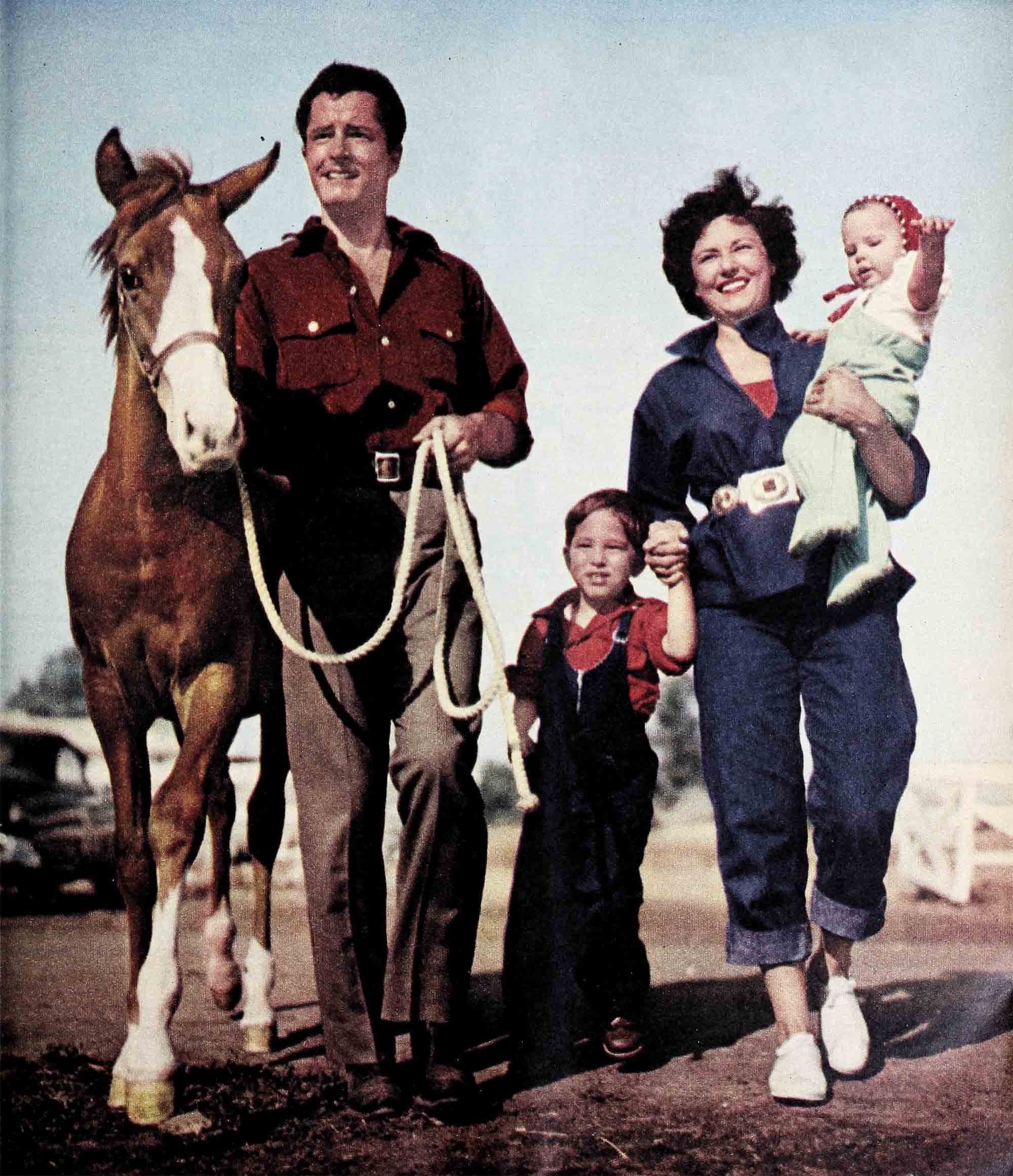
John is completely enjoying his family. They and a very few friends are the nucleus of his life. For the boy who was raised in the fullest atmosphere of Holly- wood has made, perhaps, an obvious effort to strip all of living to bare essentials. He hates formality, psuedo-sophistication, big parties, night clubs and fancy food. And yet, with complete contradiction, he buys lavishly and with no regard for money. Caught in the middle with the big house, they managed to find a beautiful ranch-style home lower on the slopes of the valley with a modest acre and a third. It will be furnished with heavy ranch-style furniture and they hope for a comfortable, easy mode of living. “A place where you can flick ashes on the floor.” John will make the decisions in the decorations. Over a period of time they have reconciled their different thinking. Pati now does the practical jobs and leaves the caprice and whimsy department to John. In his unpredictable way, John has decided to design and install the swimming pool first. He has elaborate scale drawings of a sixty-foot by twenty-five-foot pool. He has worked the shape and extras out himself. There will be a wading pool at one end and a waterfall at the other. The sloping ground from home to pool will be terraced to give a line of continuity. After he finishes the pool, he will start on the house. Their living may be simple, but it will be the most impressive simplicity on display in Hollywood. It will be the best. It is possible that after it reaches a peak of perfection, John will become bored and start looking for new landscapes to conquer. The restlessness in him has to be taken out on something physical. He has to be moving all the time—using his hands. He can’t stand to sit still to read a book or watch too much television. It’s too passive. He gets this potent, incessant energy by sleeping heavily ten hours a night. When he awakes, it takes fifteen or twenty minutes for him to become alert again.
His extremity in tastes is a constant contradiction. He wanted a bright red Cadillac convertible. Because he wanted it he feels he must have it. Yet he is quick to give a reason for it. “I’ve always wanted a car like that. If I waited, I would have driven it subconsciously for so long that it would have been an old story to me by the time I got it.”
Cecil B. DeMille started the old familiar burning for conquest in John with his quiet belief that John could be a great Joshua. Paramount has treated him as if he were valuable and worthy of giving the best. With confidence in others for him, John is slowly emerging from the deep water of rebellion that has followed his career. “Mr. DeMille made me ashamed of doing some of the pictures I’ve done just to exist. He’s made me want to give my best—really learn to express myself and work. Because I rushed through my first fifteen minutes with him, he suggested I work with a diction teacher. Of course, I do talk too fast, so it’s good. Right now I’m trying to understand the words I’m saying in one of the speeches from ‘Richard II’—pure Shakespeare. Two years ago I wouldn’t have touched it. Now I want to learn and I will.”
How long will it take Dare to knock over this new challenge? When, in his mind, will he be the best in his acting field? He will throw his background of vitality, enthusiasm and determination into this new goal. The competition here is not as isolated as those he has overcome in the past. With his provocative, unusual attitude toward life, it will be interesting to watch the nature of his progress. Will he find that after he masters his craft as the best, that he is bored and look for new fields to conquer? Or will acting—like Pati, his family and his horses—become another of the few permanent loves of his life?
THE END
It is a quote. PHOTOPLAY MAGAZINE AUGUST 1955




